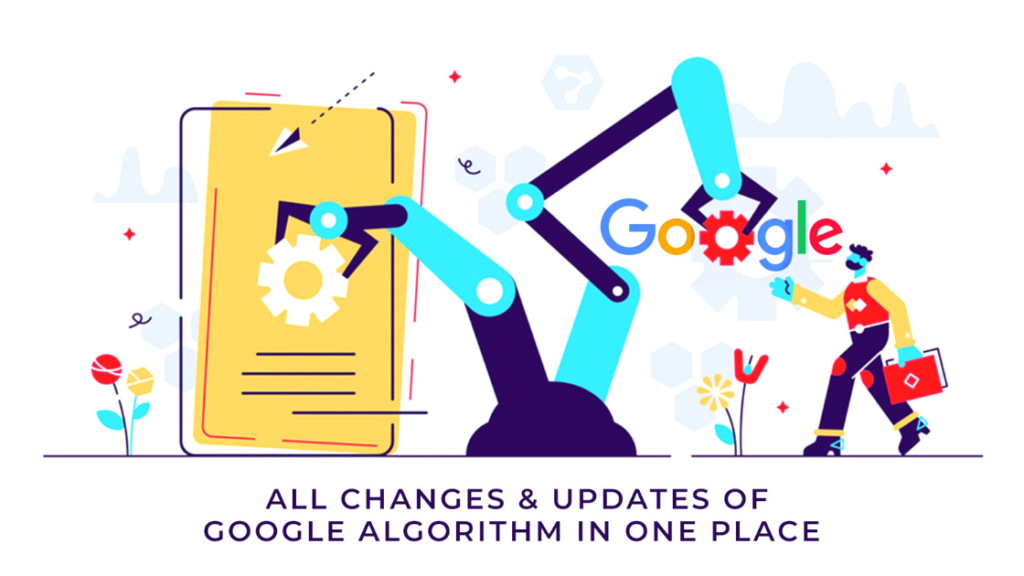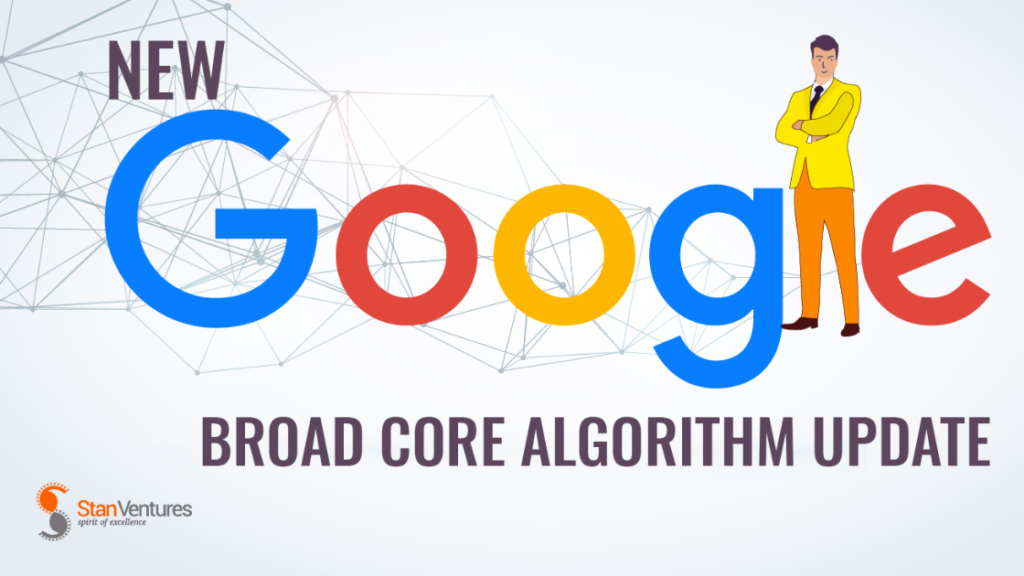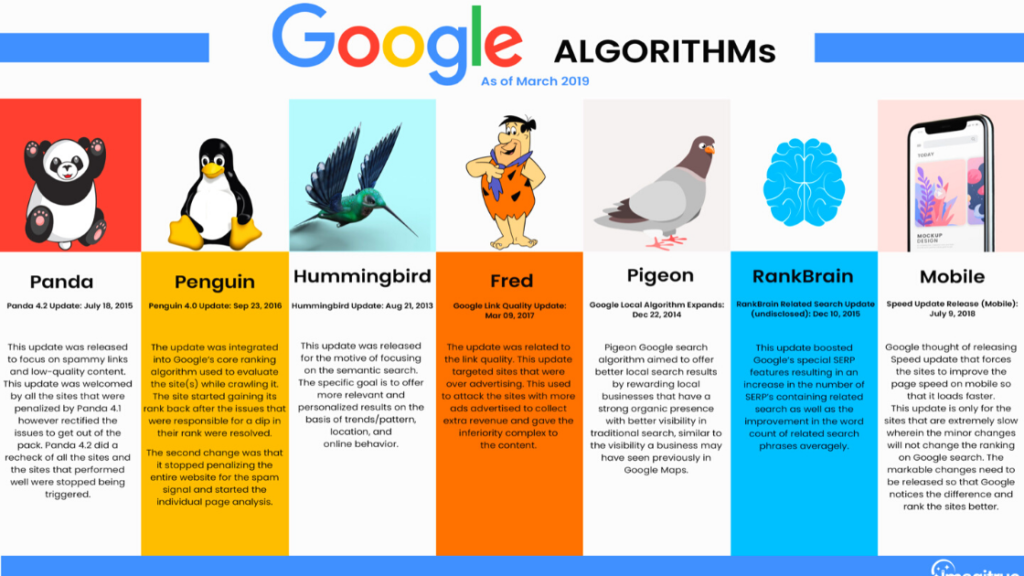What is Google algorithm?
Google search algorithm is a complex system that allows Google to find, rank and return the most relevant pages for a certain search query.
To be precise, the whole ranking system consists of multiple algorithms that consider various factors such as quality, relevance or usability of the page.
Algorithm Updates
First what is an algorithm and an example?
An algorithm is a step procedure to solve logical and mathematical problems. A recipe is a good example of an algorithm because it says what must be done, step by step. It takes inputs (ingredients) and produces an output (the completed dish).
In general, we can divide Google algorithm updates into two categories:
-Minor updates
-Core updates
Google tweaks its algorithm quite often.
And by quite often we mean several times a day. Most of these changes are very small and people don’t notice them.
Besides these small updates, Google rolls a couple of big core algorithm updates every year. These usually create a lot of buzz in the SEO community and often get catchy names.

How does Google search algorithm work?

Google’s algorithm does the work for you by searching out Web pages that contain the keywords you used to search, then assigning a rank to each page based several factors, including how many times the keywords appear on the page.
Here some points that I mention in details
1.Meaning of the query
To return relevant results, Google must understand what exactly is the user searching for and what’s his search intent.
They must understand and assess various things:
Meaning of the words – what exactly do the used words mean in the natural language?
Search intent behind the query – what does the user wants by using the particular query – definition, review, purchase, finding a specific website?
The need for the freshness of content – is the query time-sensitive and requires fresh information?
Sometimes it’s pretty straightforward. If someone uses the search query “buy new iPhone“, it’s pretty clear in all the aspects – meaning, intent and the need for freshness.
But sometimes, especially with general queries, it’s hard to understand what exactly the user meant. In these cases, Google shows what it considers to be the best results but offers additional choices that help to specify the search results.
2.The relevance of pages
Secondly, the search engine has to find what pages are relevant to the search query. In other words – to find the pages that answer the user’s search query in the best way possible.
It does so by regular crawling and indexing of all the websites on the internet and analyzing their content.
The key role is played by keywords. If the search query and the phrases that are related to the search query appear on the page, there’s a high chance the page is relevant for the user.
3.Quality of content
here are likely millions of pages for each search query, so Google has to prioritize the ones that offer quality content and demonstrate:
-Expertise
-Authoritativeness
-Trustworthiness
One of the key elements is the so-called PageRank algorithm that takes into account the quality and quantity of links pointing to a page.
4.Usability of pages
Now that Google covered the relevance and quality of content, they have to make sure the website has good usability and user-friendliness.
This includes technical aspects such as:
-Page responsiveness
-Correct appearance in all the browsers
-Page speed
-Security of the website
These may not be the most important factors but they are certainly taken into account when other factors (like relevance and quality) are equal.
5.Context and settings
Last but not least, the search results are heavily influenced by the individual circumstances and preferences of the user.
These may include things like:
–Location of the user
-History of searches
-Search settings
Here’s a typical example of the impact of location on the search results – the results for the keyword “football” in the United States vs. the United Kingdom
What is the importance of Google algorithm?
The importance of Google algorithm is the Google’s Page Ranking System because it most important for Google to determine which results should come on which position. Normally people will go through the first few results to browse the information for which they are looking for.
What are the latest Google algorithm updates?

1. Google Link Spam Algorithm Update (July 26, 2021)
Google announced an algorithm update aimed at identifying and nullifying link spam was beginning to roll out. Google warned that any sites taking part in link spam tactics could see ranking changes – with sponsored, guest, and affiliate content most likely to be impacted. Google said the update should be fully rolled out in “at least” two weeks and will impact multiple languages.
2. July 2021 Core Update Completed (July 12, 2021)
Google Search Liaison confirmed via Twitter that the July 2021 Core Update rollout was effectively completed on July 12th. No additional details were provided.
3. July 2021 Core Update (July 1, 2021)
Google Search Liaison announced via Twitter the July 2021 Core Update is rolling out and will take one to two weeks to complete. Google’s guidance for core updates can be found on the Google Search Central Blog.
4. Spam Update Part 2 (June 28,2021)
Google Search Liaison announced via Twitter that the second part of their spam update has begun on June 28th and will likely be completed on the same day. The original announcement referred to a post on the Google Search Central Blog, updated in April 2021, on how Google fought Search spam in 2020.
5. June 2021 Spam Update (June 23, 2021)
Google’s Danny Sullivan announced via Twitter an algorithm update targeted at fighting spam was rolling out to search results. The rollout of the update was to be completed the same day. He added that a second spam update would follow within a week. Google revealed no specific details on what this update was targeting.
6. Page Experience Update (June 15, 2021)
Google confirms its long-awaited Page Experience update has started rolling out. Sites should not expect to see drastic changes as a result of this update, Google says, and any sudden drops or spikes should be mitigated by the gradual rollout process. The rollout will be completed by the end of August 2021.
7. Known Victims Protection (June 10, 2021)
On June 10, Pandu Nayak,
Google Fellow and Vice President of Search, published a post on The Keyword blog. In it, he discussed Google’s work towards improving the algorithm to demote sites that “employ exploitative removals practices” and “predatory practices.” He also shared a link people can use to report online harassment.
8. Broad Core Algorithm Update (June 2, 2021)
Google Search Liaison Danny Sullivan announced via Twitter that a broad core algorithm update was about to be released. Sullivan also noted that some planned improvements weren’t quite ready for this update, so the parts that weren’t ready will be rolled out as part of second, related broad core algorithm update, scheduled for July.
9. Product Reviews Update (April 8, 2021)
This new search ranking algorithm update was designed to reward “product reviews that share in-depth research, rather than thin content that simply summarizes a bunch of products.” In their announcement, Google also shared nine useful questions to consider when creating and publishing product reviews.
10. Passage Ranking (February 10, 2021)
Google’s Public Liaison for Search, Danny Sullivan, announced via Twitter that Passage Ranking officially launched for English-language queries in the United States. According to Google: “This change doesn’t mean we’re indexing individual passages independently of pages. We’re still indexing pages and considering info about entire pages for ranking. But now we can also consider passages from pages as an additional ranking factor….”
These are some of important Google algorithm updates of 2021 which I covered and their are more .
These are some important updates

Here’s a list of the most well-known algo updates in the last decade that shaped the way Google algorithm works:
1.PANDA
Date: February 24, 2011
Hazards: Duplicate, plagiarized or thin content; user-generated spam; keyword stuffing.
How it works: The Panda algorithm update assigns a so-called “quality score” to web pages. This score is then used as a ranking factor. Initially, the effects of Panda were mild, but in January 2016 it was permanently incorporated into Google’s core algorithm. Since then, update rollouts have become more frequent, so both Panda penalties and recoveries now happen faster.
2.PENGUIN
Date: April 24, 2012
Hazards: Spammy or irrelevant links; links with over-optimized anchor text.
How it works: Google Penguin’s objective is to down-rank sites whose backlinks look unnatural. This update put an end to low-effort link building, like buying links from link farms and PBNs.
3.HUMMINGBIRD
Date: August 22, 2013
Hazards: Keyword stuffing; low-quality content.
How it works: The Hummingbird algorithm helps Google better interpret search queries and provide results that match searcher intent (as opposed to the individual terms within the query). While keywords continue to be important, the Hummingbird algorithm makes it possible for a page to rank for a query even if it doesn’t contain the exact words the searcher entered. This is achieved with the help of natural language processing that relies on latent semantic indexing, co-occurring terms and synonyms.
4.MOBILE
Date: April 21, 2015
Hazards: Lack of a mobile version of the page; poor mobile usability.
How it works: This, and subsequent mobile search updates (2018, 2020) have shifted the focus from a desktop to a mobile version of your website. Today, Google ranks all websites based on how fast and user-friendly their mobile versions are.
5.RANKBRAIN
Date: October 26, 2015
Hazards: Lack of query-specific relevance; shallow content; poor UX.
How it works: RankBrain is a part of Google’s Hummingbird algorithm. It is a machine learning system that helps Google understand the meaning behind queries and serve best-matching search results in response to those queries. Google calls RankBrain the third most important ranking factor.
While we don’t know the exact formula behind this major update, the consensus is that RankBrain is responsible for customizing a user’s Google search results. Basically, Google goes beyond a person’s search query and takes into account the larger context, like synonyms, implied words, and personal search history.
6. Fred
Date: March 09, 2017
Hazard: Google link quality update
How it works: The update was related to link quality .This update targeted sites that were over advertising. This used to attack sites with more ads advertised to collect extra revenue and gave the inferiority complex to the content.
7.Pigeon
Date: Dec 20, 2014
Hazard: Google local algorithm Expands
How it works: Pigeon Google search algorithm aimed to offer better local search results by rewarding local businesses that have a strong organic presence with better visibility in traditional search, similar to the visibility a business may have seen previously in Google Maps.
Thats all about Google Algorithm Updates. I hope this article is helpful for you. If you have any suggestion then let me know in the comment section. Thank you have a nice day.